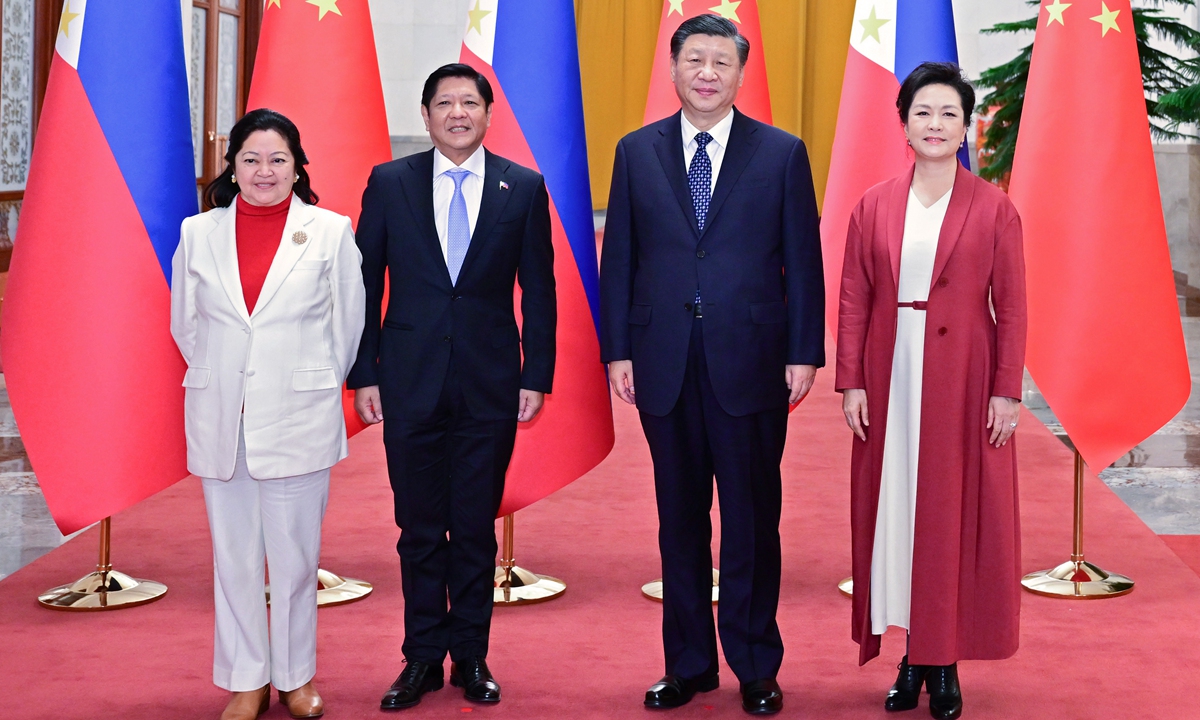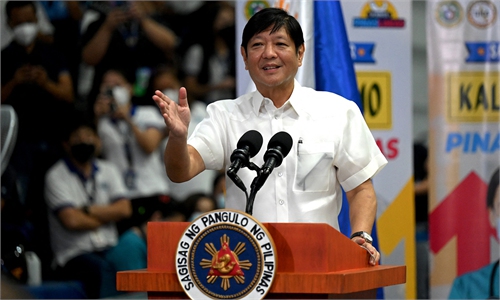
Chinese President Xi Jinping and his wife Peng Liyuan hold a welcome ceremony for Philippine President Ferdinand Romualdez Marcos Jr and his wife Maria Louise at the Great Hall of the People in Beijing on January 4, 2023, ahead of the two leaders' meeting. Photo: Xinhua
Chinese President Xi Jinping met visiting Philippine President Ferdinand Marcos Jr. in Beijing on Wednesday, with both sides expressing great hope, confidence and determination to further develop bilateral relations to a higher level. Chinese experts said the successful visit proves there is little room for outside forces like the US to meddle in the South China Sea situation and interrupt the two countries' efforts to promote common development.
According to a readout released by the Chinese Foreign Ministry, Xi said to Marcos that "48 years ago, your father [Ferdinand Marcos Sr., former Philippine president 1965-1986] and the old generation of Chinese leaders" made the historic decision to establish formal diplomatic ties between China and the Philippines.
"Hopefully, your visit will not only be a 'trip of reminiscence' but also a 'trip of opening future.' China will always place the Philippines at a prioritized direction for neighboring diplomacy, and to insist looking the China-Philippines relations from a height of strategy and over-all situation," Xi noted.
Xi said that China and the Philippines are both developing countries in Asia, and the development of the two countries is rooted in a regional environment of good neighborly and friendly relations, and rooted in a big Asian family of win-win cooperation. "The Chinese side is willing to focus on cooperation and development with the Philippines and other ASEAN members, and safeguard the centrality of ASEAN in the regional cooperation." It will make the region get rid of the shadow of the Cold War, and free from bloc-to-bloc confrontation, and remain to be a high ground for development and prosperity, Xi noted.
Marcos said it gives him a great pleasure to pay the long-awaited visit to China and that this is his first state visit to a non-ASEAN country. Marcos said he hopes to prove to the world through this visit that Philippines-China relations are in good shape and important, and both sides are committed to upgrading the ties.
The Philippine president said during the meeting that the Philippines is willing to keep appropriately handling the maritime issues via friendly coordination with China, and will restart consultation with China on exploration and mining of oil and gas.
Marcos thanked China for the great assistance in helping the Philippines fight the COVID-19 pandemic, and he hopes after the pandemic, more Chinese people will come to the Philippines for tourism and study. "I have full confidence for the prospect of the China-Philippine relations' development," he said.
After the meeting, the two leaders witnessed the signing of a series of cooperation documents related to the China-proposed Belt and Road Initiative, covering fields including agriculture and fisheries, infrastructure, finance, customs, e-commerce and tourism.
New golden age
Chinese analysts said the China-Philippines relations will see great development in 2023 since the two countries will put in joint efforts to promote the ties with full speed. These not only cover traditional fields of cooperation like infrastructure, agriculture and trade, but include ones that require high-level mutual trust like joint exploration of energy resources in the South China Sea, and coordination on significant matters about politics and security like the Russia-Ukraine conflict and the Taiwan Straits situation that both sides are concerned about.
Xu Liping, director of the Center for Southeast Asian Studies at the Chinese Academy of Social Sciences, told the Global Times on Wednesday that "the state visit by Marcos is a trip to initiate a 'new golden age' for the China-Philippines relations."
China and the Philippines had a "golden age" during the leadership of former Philippine president Gloria Macapagal Arroyo, Xu said. During that time, the two countries respected each other and saw win-win cooperation, and although disputes on the South China Sea issue existed, the two countries did not intensify conflicts or frictions, but appropriately managed their differences and promoted cooperation at the same time, Xu noted.
This golden age started by former president Arroyo was ended by the administration of Benigno Aquino III since the Aquino government decided to provoke China on the South China Sea issue and create a series of conflicts and tensions in the region to serve the US strategy that aims to contain China and interrupt regional peace and stability.
The Marcos government is trying to improve bilateral ties based on the foundation that was established during the tenure of former Philippine president Rodrigo Duterte, who greatly fixed ties with China and rejected US attempts to use the Philippines as a pawn to contain China, Xu said.
China and the Philippines share very broad common interests and have the potential to explore more benefits in fields like infrastructure construction, agriculture and energy cooperation, as well as people-to-people and cultural exchanges, he said.
For security affairs, the two countries will build more mechanisms to improve communication, such as a communication channel between the foreign ministries of the two sides on the South China Sea issue, and will also improve coordination mechanisms set up during tenure of Duterte to prevent sovereignty disputes that could damage bilateral ties, analysts said.
On international hotspot issues of shared concern like the Russia-Ukraine conflict and sensitive matters related to interference from outside forces that affect regional peace and stability like the Taiwan Straits situation, the two sides will also boost coordination and build more consensus, so that bilateral ties will be able to withstand the impact of potential geopolitical crises in the future, Xu noted.
Impacts from the US
The Philippines is an ally of the US, so it would be natural to see Washington attempt to pressure and exert influence on Manila to interrupt China-Philippines ties, said analysts.
Zhou Fangyin, a research fellow at the Guangdong Institute for International Strategies, told the Global Times that as long as China and the Philippines can withstand the impacts and interruption from the US and stabilize the South China Sea issue together, that will be a very big success for regional security.
Marcos has a six-year term, and US policymakers consider that the next decade will be crucial for their "competition" with China, so if China can ensure a peaceful South China Sea situation together with the Marcos' government and other regional countries, that would be historically significant, Zhou noted.
According to the content of the talks between Xi and Marcos, the two countries share common ground to appropriately handle issues on the sea, and agreed to talk about joint exploration and mining of oil and gas resources in the South China Sea, so experts consider the likelihood of the US leveraging sovereignty disputes to interrupt the two countries' cooperation is slim.
The Philippines has learned from the past, and current leaders understand what their country can get from pragmatic and friendly cooperation with China, and what they would lose if they unwisely allow themselves to be used by Washington to contain China. Today, since the US has very limited strength and influence to offer concrete benefits to seduce regional countries to serve its hegemonic strategy, the chance of Washington interrupting the South China Sea issue is getting less and less, analysts said.


